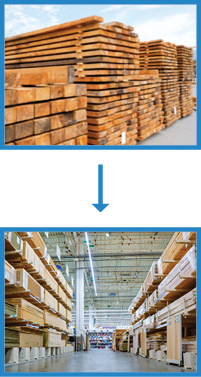Outbound logistics is the area of shipping where businesses tend to put the most emphasis. It’s a common formula: choose a carrier, determine pricing and select the needed services. They have complete control over this process and can do an about-face at any time. However, inbound logistics is often in the hands of their suppliers who pick their favorite carriers, select the service they want and invoice the shipper for the cost.
In reality, suppliers largely like it that way. They don’t want to give up control of their freight shipping for the same reasons you want to take it over: speed, cost and reliability. However, when businesses no longer manage their own inbound freight, it means they no longer have complete oversight of their supply chain.
But what if there was an efficient way to manage both your inbound and outbound logistics so you could have complete visibility of your freight shipping operations without placing extra burden on your business? Fortunately, for shippers, there is a way.

Inbound Logistics
Involves the flow and shipment of goods into a business. This could include raw materials or assembled products.
Outbound Logistics
Process of moving inventory from the business location to customers. It includes packaging, shipping and delivery.
Inbound Logistics
Involves the flow and shipment of goods into a business. This could include raw materials or assembled products.

Outbound Logistics
Process of moving inventory from the business location to customers. It includes packaging, shipping and delivery.

Optimize Your Inbound and Outbound Logistics With Dedicated Fleet Services
You don’t always need to let your supplier control your inbound logistics. Your supply chain shouldn’t be a one-way street since it’s important you know when inbound freight will arrive. Without clear vision, managing dock congestion and scheduling dock workers for loading and unloading is challenging. It’s also difficult to be certain of how much inventory to keep on hand while waiting for a truck to arrive.
To create efficiency in your supply chain and put shipments on a predictable schedule, working with carriers that offer dedicated fleet services to handle both your inbound and outbound freight will help you gain a competitive advantage. Dedicated carriers provide a long-term commitment at a set price — opposed to spot rates — to ship your goods. There are many advantages to these relationships, including the following:
- Carrier capacity — Lining up dedicated carriers with a semi-yearly or yearly contract helps eliminate issues of carrier capacity.
- Effective fronthaul and backhaul shipping — Using a dedicated carrier for inbound and outbound freight between two destinations is more sustainable, efficient and cost-effective.
- Fewer hassles — There’s no need to find carriers for every shipment or jostle for better pricing. Once you contract with a dedicated fleet services provider, you’re set for an extended period.
- Cost effective — Carriers are more willing to negotiate lower prices for contracts with consistent freight volume. When spot rates decrease, however, you may be paying higher prices if your contract was negotiated when rates were higher. This is one reason to review contracts annually.
- Product integrity — After you build a relationship, you can trust your carrier to know how to handle complex shipments and those with special handling requirements. They can also provide the necessary equipment for safe transport.
- On-time delivery — Having a set schedule helps guarantee your shipments will be picked up and delivered on time, which is particularly important for tight delivery windows.
- Inventory management — When working with dedicated carriers, you will know when inbound shipments will arrive, which enables better inventory control, improved cash flow and other transportation optimization benefits.
- Long-term relationships — Your carrier drivers will become familiar with the schedule, route and people at your locations, which can help with delivery and building customer relationships.
Pro Tip
A dedicated carrier is another word for contract carrier. Instead of getting spot quotes, dedicated/contract carriers have a longtime commitment at a set price to ship your goods.
Leverage a Third-Party Logistics Provider To Maximize Dedicated Carriers
A third-party logistics (3PL) company can guide you in taking a proactive approach with your vendors. Using historical data and predictive analysis, they’ll help you understand the cost benefits of handling both outbound and inbound freight with a dedicated carrier of your choice.
You’ll also have access to thousands of full truckload shipping (FTL) carriers in the 3PL network. Using their transportation management system (TMS), you can do a quick search to find carriers with ongoing capacity and the equipment and services you need for your shipments. Through the TMS, you’ll also have full visibility of the status of your shipments so you can monitor them and prepare for their arrival.
GlobalTranz can help with all your inbound and outbound shipping needs!
GlobalTranz has decades of experience in the logistics industry and helps thousands of shippers of all sizes move products with great efficiency. We are also part of WWEX Group, alongside Worldwide Express and Unishippers. Combined, these three companies make up one of the largest and most diverse 3PLs in the industry, providing shippers with top solutions and financial stability that helps them succeed. Through our full suite of shipping solutions, we service more than 120,000 shipments daily, and have the resources and expertise to work with companies of all sizes in nearly every industry.
See how GlobalTranz can help you transform your freight shipping. If you are ready to talk to an expert, reach out for a free consultation today!
